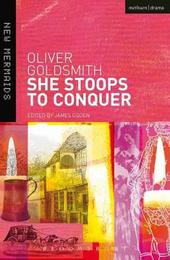
|
She Stoops to Conquer
Paperback / softback
Main Details
Description
The action of She Stoops to Conquer (1773) is largely confined to a night and a day in Squire Hardcastle's somewhat dilapidated country house: Young Marlow, on his way there to meet the bride his father has chosen for him, loses his way and arrives at the house assuming it is an inn. The prospect of meeting the genteel Miss Hardcastle terrifies the diffident youngster; but the serving-girl Kate - in fact, Miss Hardcastle, who chooses not to clarify the misunderstanding - immediately catches his fancy and cannot complain of a lack of ardour in her well-born suitor. After a series of trifling confusions and the inevitable eavesdropping-from-behind-a-screen, all is resolved so pleasingly that the comedy has been a favourite with amateur and professional companies and their audiences for over 230 years.
Author Biography
Oliver Goldsmith (1730-74) was an Irish poet, playwright, novelist, and journalist, whose two plays have outlived the efforts of all his contemporaries except Sheridan. Dr Johnson described him as "a very great man", while Goethe would later write, "To Shakespeare, Sterne, and Goldsmith my debt has been limitless." Goldsmith's youth gave little promise of his future achievements. After attending Trinity College, Dublin, he abandoned plans to be ordained. He thought of emigrating to America but missed his ship. He then briefly studied medicine before travelling through Europe, partially supporting himself by busking. On his return, he earned a meagre living by translating and reviewing; it was in this period that he emerged as an essayist of talent. Goldsmith's first play, The Good-Natured Man, was turned down by Garrick; the elder Colman subsequently produced it at Covent Garden (1768) though with only mild success. Goldsmith made his name as a playwright with the comedy She Stoops to Conquer (1773), in which two men mistake a private house for an inn (a mistake the playwright had himself once made). Goldsmith's only novel The Vicar of Wakefield (1766) was successfully adapted for the stage in 1878 with Ellen Terry in the role of Olivia, a part later played on tour by her sister, Florence Terry. Goldsmith's Irish impudence and inconsequential style of chat often irritated his London contemporaries. Horace Walpole called him "an inspired idiot" while Samuel Johnson commented "No man was more foolish when he had not a pen in his hand, or more wise when he had." James Ogden is a former Senior Lecturer in English at Aberystwyth University, UK. James Ogden is a former Senior Lecturer in English at Aberystwyth University, UK.
ReviewsOliver Goldsmith's comedy was a milestone: yes, it's fast and funny, almost farcical at times, a great night out, and so on, but it's also a psychological masterpiece written at the time when English society began its stately progress towards its admirable class system. Sunday Times "A bomproof comedy Oliver Goldsmith's play is about the clash between town and country, between varying degrees of pretension." Robert Dawson Scott, The Times, 04.06.08 'Against Sean Crowley's elegant blank canvas of a set, which allows a home to be mistaken for an inn, Goldsmith's themes of class and snobbery unfold with delicious clarity. The performances are both ticklish and sophisticated - the actors step outside the action to address the audience directly - and yet played for traditional laughs and tremendous relish.' Elisabeth Mahoney, Gaurdian, 01 May 2009
|